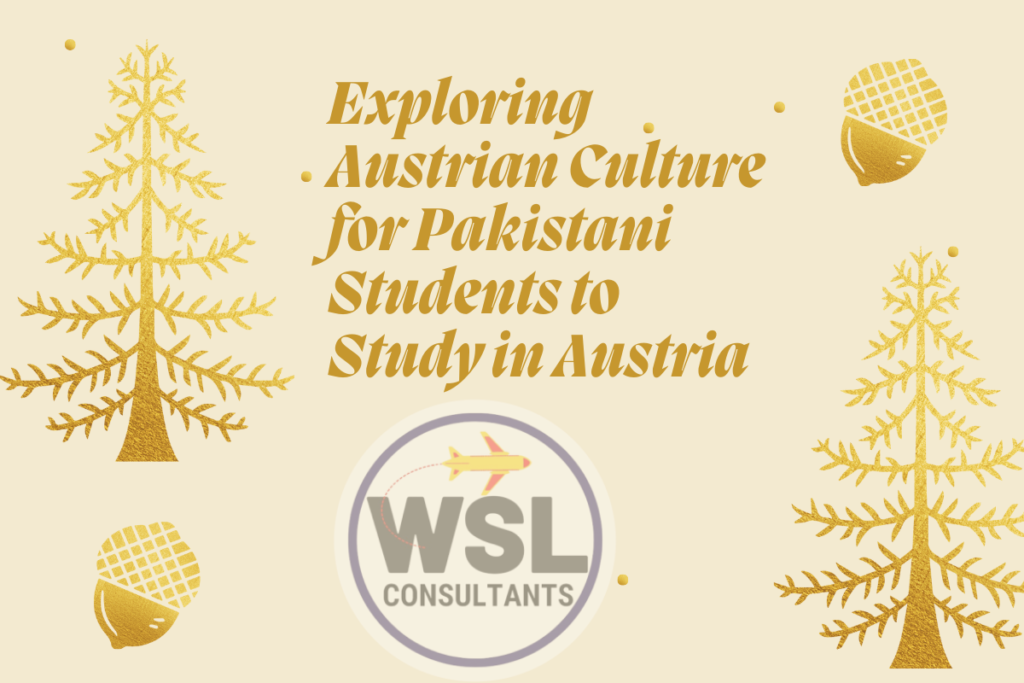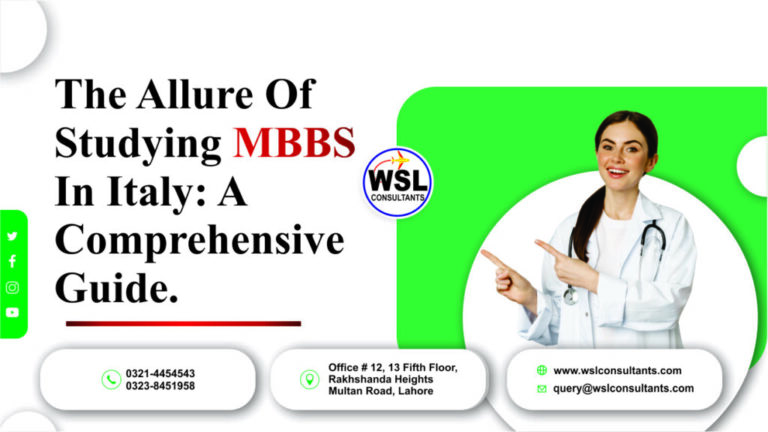Exploring Austrian Culture for Pakistani Students to Study in Austria

As a Pakistani student embarking on a journey to study in Austria, it’s not only essential to excel academically but also to immerse yourself in the rich tapestry of Austrian culture and traditions. Understanding the holidays and customs will not only enrich your experience but also help you integrate into the local community.
Christmas:
- Advent Season and Study in Austria: The Advent season is a magical time in Austria, and as a Pakistani student, you’ll witness the cities transforming with festive lights and markets. Balancing your studies during this season can be an opportunity to experience the warmth of Austrian hospitality through shared traditions and celebrations.
- Christmas Eve Celebrations: While focusing on your academic pursuits, make sure to participate in Christmas Eve celebrations. It’s a time when Austrian families come together for a festive dinner and exchange of gifts. Engaging in these traditions can offer you a sense of belonging in your temporary home.
Easter:
- Easter Traditions for Students: As Pakistani students while study in Austria during Easter, you’ll encounter vibrant traditions such as egg decorating and Easter markets. These can be excellent opportunities to take a break from your studies and explore the cultural richness surrounding this holiday.
- Utilizing Easter Break: Many Austrian schools and universities have an Easter break. Utilize this time to travel and explore the country, immersing yourself in local customs and festivities.
New Year’s Eve (Silvester):
- Balancing Studies and Celebrations: New Year’s Eve, or Silvester, is a time of joyous celebrations. As a Pakistani student, while study in Austria, it’s crucial to find a balance between enjoying the festivities, perhaps attending public events, and ensuring you meet your academic responsibilities.
- Reflecting on Achievements: Silvester is also a time of reflection. Take a moment to reflect on your academic achievements and set goals for the upcoming year, aligning your studies with personal growth.
Fasching (Carnival):
- Incorporating Fasching into Student Life: Fasching, the Austrian Carnival season, is marked by colorful parades and elegant balls. Many universities host Fasching events, providing an opportunity to engage with fellow students and experience the lively Austrian carnival spirit.
- Networking at Vienna Opera Ball: If you’re in Vienna, don’t miss the Vienna Opera Ball, a prestigious event during the carnival season. Attending such events not only allows you to witness Austrian elegance but also presents networking opportunities for your academic and professional future.
National Day (National feiertag):
- Understanding Austrian History: National Day in Austria is a celebration of the nation’s history. As a Pakistani student, take the time to understand the significance of this day and perhaps engage in cultural events or historical lectures to deepen your connection with the host country.
- Balancing Academics and Patriotism: Use National Day as an occasion to strike a balance between your academic commitments and embracing Austrian patriotism. Attending events and celebrations can contribute to a holistic study in Austria experience.
Corpus Christi:
- Participating in Religious Observances: Corpus Christi is a religious celebration in Austria marked by processions. Even if you’re not of the same faith, observing and respecting these traditions can provide insights into the cultural diversity of the country.
- Cultural Exchange: Use Corpus Christi as an opportunity for cultural exchange. Engage in conversations with locals, learn about their beliefs, and share your own cultural background with an open mind.
Krampusnacht:
- Experiencing Krampus Traditions: Krampusnacht, with its folklore and parades, is a unique Austrian tradition. Embrace this somewhat eerie celebration, attend local events, and understand the cultural significance behind the Krampus figure.
- Connecting with Locals: Use Krampusnacht as a conversation starter with locals. Engaging in discussions about traditions and folklore can foster connections, providing you with a deeper understanding of Austrian culture.
Viennese Ball Season:
- Balancing Academics and Extracurriculars: The Viennese Ball Season, known for its elegance and tradition, offers a chance to experience the sophisticated side of Austrian culture. Balance your academic responsibilities with attending at least one ball for a memorable cultural experience.
- Networking and Socializing: Viennese balls are not just about dance; they are also social events. Utilize these occasions to network with professionals, potentially opening doors for internships or future career opportunities.
Coffee Culture:
- Studying in Vienna’s Coffeehouses: Austrian coffee culture is renowned worldwide. As a student, make Vienna’s historic coffeehouses your study space. Immerse yourself in the unique atmosphere, savoring coffee while completing your assignments.
- Building Connections: Coffeehouses are not just for studying; they are also social hubs. Strike up conversations with locals, fellow students, and professors over a cup of coffee to broaden your social and professional network.
Tips for Pakistani Students Study in Austria
- Language Integration: While many Austrians speak English, learning basic German phrases will enhance your experience and facilitate better communication, both academically and socially.
- Culinary Exploration: Embrace the local cuisine, including traditional dishes like Wiener Schnitzel and Sachertorte. Exploring Austrian gastronomy can be a delightful way to connect with the culture.
- Explore Beyond the Campus: Austria’s beauty extends beyond university walls. Take time to explore historical sites, museums, and natural wonders, enhancing your understanding of the country’s history and geography.
- Attend Cultural Events: Participate in cultural events, festivals, and local gatherings. This not only deepens your connection with Austria but also allows for meaningful interactions with locals.
- Stay Informed: Keep abreast of local news and events to ensure you’re aware of any academic or cultural opportunities that may enhance your study abroad experience.
Study in Austria is not just about academics; it’s a holistic experience that involves immersing yourself in the cultural fabric of the country. By embracing Austrian holidays and traditions, you’ll not only enrich your time as a student but also create lasting memories and connections. Study in Austria offers more than academic excellence; it’s an opportunity to grow personally, culturally, and professionally. By actively participating in cultural events, embracing local traditions, and exploring the diverse facets of Austrian life, you’ll make the most of your study abroad experience and create lasting memories.
Conclusion:
In conclusion, for Pakistani students study in Austria, the exploration of Austrian culture goes beyond the academic realm, offering a holistic and enriching experience. Embracing the vibrant tapestry of Austrian traditions, from festive holidays like Christmas and Fasching to the elegance of Viennese balls, becomes an integral part of one’s study abroad journey. Engaging in cultural events, attending music performances, and immersing oneself in outdoor activities contribute to a well-rounded experience that transcends the boundaries of the classroom. Moreover, the emphasis on language exchange, community engagement, and sustainability aligns with the values that define Austrian society. By actively participating in these cultural facets, Pakistani students not only enhance their academic pursuits but also foster meaningful connections and a deep appreciation for the cultural mosaic that is Austria.
FAQs for Pakistani Students Study in Austria:
- Q: How can I balance my academic responsibilities with participating in cultural events?
- A: Planning and time management are crucial. Create a realistic schedule that allows for both academic commitments and cultural exploration. Use breaks and weekends efficiently to attend events and engage in activities.
- Q: Are there opportunities for part-time work for international students in Austria?
- A: Yes, international students in Austria are allowed to work part-time during their studies. Ensure compliance with regulations and explore opportunities that align with your academic schedule.
- Q: How can I make the most of language exchange programs?
- A: Actively participate in language exchange events organized by your university. Practice speaking German with native speakers, attend cultural gatherings, and be open to sharing your own language and culture.
- Q: What are some sustainable living practices in Austria?
- A: Austria places a strong emphasis on sustainability. Practice eco-friendly habits, such as using public transportation, recycling, and supporting local and sustainable products. Engage with university initiatives promoting environmental awareness.
- Q: How can I explore neighboring European countries on a student budget?
- A: Look for student travel discounts, plan trips during off-peak seasons, and consider budget accommodations. Utilize the central location of Austria to explore nearby countries with affordable transportation options.
These FAQs provide insights into common concerns for Pakistani students study in Austria, offering practical advice to enhance their overall study abroad experience.


